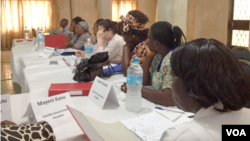The Sierra Leone government has launched a new initiative to help stop the spread of the Ebola virus. Twenty-five government hospitals will soon have infection and prevention control (IPC) units - the first of their kind in the country.
Seventy-five healthcare workers from across the country are taking part in the two week training, which includes classroom theory and hands on training.
They are learning more about IPC which includes good hand washing practices and wearing proper PPE - personal protective equipment - when coming in contact with a suspected Ebola patient.
Not only will having more IPC units protect patients better but healthcare workers as well. Several international partners are supporting the initiative
“The WHO [World Health Organization] and CDC [Centers for Disease Control] are just helping us and providing the technical support, for example they are paying the tutors from Africa, [Infection Control AfricanNetwork] to come and educate our staff," explained Nanah Sesay - Kamara - national IPC focal person at the Ministry of Health and Sanitation.
"Even in terms of the office they are providing computers, but they plan to help us just for 12 months then we should be able to do this ourselves," she added.
Since the Ebola outbreak began last year, more than 3,500 people have died from the virus in Sierra Leone.
The number of new infections had been on the decline. But with a recent spike of Ebola cases in the country, the IPC timing is crucial to ensure better timely screening, says Dr. Stacey Mearns, health coordinator for the International Rescue Committee, (IRC).
“I think this project is going to play a vital role. Without this project, it will be nearly impossible to get to zero cases, because health facilities will not remain safe and they will remain an ongoing source of transmission," Mearns said.
The IRC is another partner supporting the ministry and is bringing in nurse mentors from Kenya and Canada to work with health staff. Mearns says the IPC concept will also make a difference in the prevention of other diseases spreading.
“As we continue with Ebola response having strong IPC in hospitals will be critical to getting to zero cases. But also this will set the foundation for creating a much safer health system beyond Ebola and will have far reaching impacts for cholera and many other transmissible diseases we have here," Mearns said.
Amy Kolwaite, a nurse epidemiologist with the CDC, explained how trainees can help spread the message.
“They can go back to their hospitals and train - not only nurses but the cleaners, the porters, the kitchen staff, the physicians, train all staff at the hospital to not only protect themselves but protect their patients and their families," she said.
Two more sets of training will take place over the course of this year. The hope is to have similar measures in the two other mainly Ebola affected countries Guinea and Liberia.




